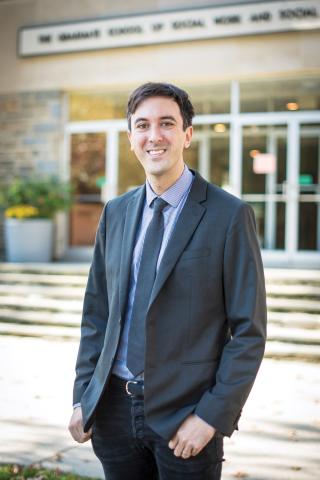It Takes a Community
How a Philadelphia center for the LGBT community helped change mental health care.
The removal of homosexuality from the Diagnostic and Statistical Manual of Mental Disorders by the American Psychiatric Association in late 1973 is considered a landmark moment in the history of the LGBT community in the U.S.
But recent research undertaken by David S. Byers, Stephen Vider, and Amelia Smith reveals that community-based clinics played a key role in developing a model of LGBT-affirmative counseling.
Founded in Philadelphia in 1973, the Eromin Center was one of the first organizations in the country to provide mental health services to sexual minorities. At the time of the Center’s founding, the psychiatric community conceptualized LGBT behavior as a mental disorder.
Byers, an assistant professor in the Graduate School of Social Work and Social Research, and his co-authors describe Eromin’s approach as “clinical activism.” Their study, based on archival records and oral histories with Eromin Center staff and volunteers, reveals an iterative and improvisational approach to community-based affirmative care. Rather than waiting for national leadership or institutional change, they aimed to respond directly to otherwise unrecognized needs of LGBT people through psychotherapy and social services.
Eromin, the authors write, “framed the major problem facing LGBT people not as inherent psychopathology but as marginalization.” Their goals were twofold: to promote their clients’ psychological well-being and to fight stigmatization.
By 1977, more than 1,000 people had received care at Eromin. Staff tended to base their work on their own experiences, an approach with inherent limitations in particular because most were white, cisgender, and identified as gay and lesbian. Eromin attempted to address these limitations by pioneering counseling and support services for transgender clients and, in the early 1980s, by working to develop programming for LGBT people of color.
Eromin closed in 1984, and its significance has been largely overshadowed by the broader policy changes in mental health care. But its story provides a crucial case study in community-based clinical activism and affirmative practice with continuing salience today.
There is still work to be done, Byers says. “Today, social workers, psychiatrists, and psychologists often fail to listen with an ear to the political aspects of their practice,” he says. “We are not trained to work together with our clients or to be creative in the collaboration. However, clinicians today absolutely need to pursue new forms of clinical activism. The status quo in community-based mental health care is often ethically unacceptable.”
"Clinical Activism in Community- Based Practice: The Case of LGBT Affirmative Care at the Eromin Center, Philadelphia, 1973-1984" by David S. Byers, assistant professor at GSSWSR; Stephen Vider, Cornell University assistant professor of history; and Amelia Smith, a social worker at the Mazzoni Center in Philadelphia, appears in the November 2019 issue of American Psychologist.
Published on: 05/20/2020
